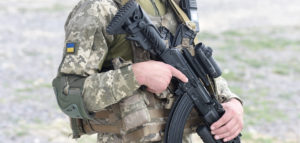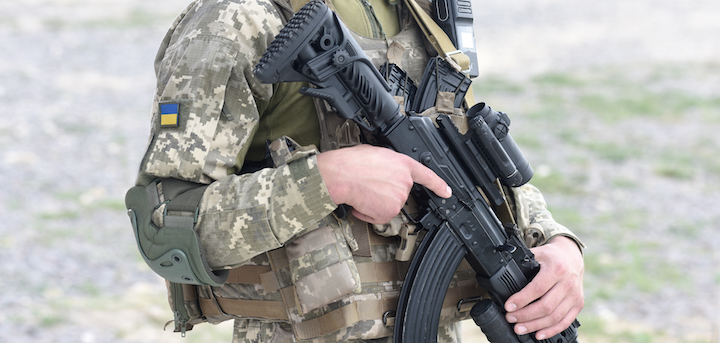Elizabeth Carey argues that, in the harsh light of the Russian invasion, some of the responsible investment assumptions of institutional investors about the defence sector look naïve and in need of realpolitik updating.

We have all been left aghast, traumatised and outraged watching Russia’s unprovoked invasion of Ukraine unfold as we absorb the constant flow of news stories through computer screens and mobile phones, or from newspapers, radio and TV. Brave Ukrainians have subverted Russia’s false narrative of coming as liberators to rescue a country governed against its will, expecting a quick and easy victory. The unprovoked Russian attack has subverted two other false narratives: first, that we live in a peaceful world (at least in the developed countries), so do not need to invest in weapons or other defensive capabilities; and, second, that we could somehow pursue net-zero targets alongside stable economic growth while large European countries remained dependent on hydrocarbon imports from Russia.
The Russian invasion of Ukraine has blasted away our sense of security in a world governed by laws and treaties rather than tanks and artillery. It has also shone a harsh interrogator’s light onto the West’s dependency on fossil fuel exports from autocratic regimes, where currency from exports builds up arsenals to be used against civilian populations.
Fortunately, leaders in democracies around the world seem to have woken up. An impressively speedy, coordinated response by governments and industry has isolated Russia financially and commercially from the rest of the world. Russia-related trading has become illiquid; Russian foreign reserves were put beyond use; Aeroflot flies no further than Belarus; and Russian manufacturing of consumer items like cars has ground to a halt. In an unexpected show of resolve, Germany’s Chancellor Scholz turned the newly finished Nord Stream 2 gas pipeline into an instant museum piece by refusing to certify its opening. Even more unexpected was Germany’s reversal of policies in place since World War II when it agreed to send arms to Ukraine plus increase national defence spending.
Reassessing ‘responsible’ investing
In the harsh light of the Russian invasion, some of the responsible investment beliefs of institutional investors look naïve and similarly in need of realpolitik updating. Prohibitions against investing in defence industries now look incongruous considering Ukraine’s urgent need for more military equipment, thus far supplied mostly by NATO members. That military equipment has helped Ukraine forces defend their country, like a modern-day David locked in mortal combat against a nuclear-armed Goliath. More arms are urgently needed.
President Putin’s ambition is unlikely to stop at Ukraine. The newly reinvigorated NATO defensive alliance, which can match Russia’s arsenal thanks to the US, is doubtless the only thing that makes him think twice about rolling onward into the Baltic States, Poland and the rest of the former Soviet states that he longs to reconquer.
Similarly, the unexpected resolve of the invaded population and liberal democracies around the world, backed by their missiles, ships, submarines, armies and other combat capabilities—along with the global coalition of the willing across governments, regulators, central banks and industry, who are now isolating Russia economically—may give China’s Xi Jinping second thoughts about undertaking a Ukraine 2.0 to take Taiwan by force.
The example of the courageous Ukrainians reminds us that if we believe in democracy and an open society, we must be willing to fight for it. Excessive reliance on treaties and trade, and the belief that commercial interests would sway geopolitics have proved a huge miscalculation. Our freedoms and democratic culture, which lie at the heart of ESG and RI, depend on robust defence capabilities plus a willingness to use them. If we believe might does not make right, then logically we must be willing to commit our capital to defence manufacturers and engage with them, as with any other company or industry.
The tragic wake-up call now coming from Ukraine should make LGPS funds and other institutional investors reconsider the appropriateness of investment exclusions that ban the defence sector. Instead, we need to include defence manufacturers, of which there are several in the UK, in the range of investable companies, subject to normal investment parameters of returns, risk, diversification, and relevant ESG considerations.
Prohibitions against investing in defence industries now look incongruous considering Ukraine’s urgent need for more military equipment.
Room151’s LGPS Quarterly Webcast
26 May 2022
Online
Public sector delegates – register here
Engaging with defence companies
Investment exclusions should focus more narrowly on companies that make cluster bombs, thermobaric bombs or other unnecessarily cruel devices that target civilian populations and are prohibited by the Geneva Convention. To be good stewards of our investments, and ultimately of our society, we must engage with defence companies based on a set of RI beliefs and ESG principles that are fit for purpose. Not to do so puts us in the hypocritical position of free riders expecting to call on someone else’s blood and treasure should our freedoms and values ever be challenged by force.
Practically speaking, a change in mentality should translate into changes to ESG-tilted indices from MSCI, FTSE Russell and other providers, where the defence sector is classified as “anti-social” activities. Leading index providers moved swiftly to remove Russia from Emerging Markets and global indices. Now they, along with investors and those responsible for pension fund governance, should refine the defence company exclusion to mean just those in breach of the Geneva Convention. In the UK and US, clear majorities in Parliament and Congress have recognised the need for increased public spending on defence. Returns from investment in competent manufacturers should increase similarly.
LGPS funds should not be cut off from these potential returns by views contrary to democratically agreed public policy. Moreover, becoming an investor will provide an opportunity for LGPS funds, through pools and the Local Authority Pension Fund Forum, to engage with the defence industry over issues like arms sales to certain countries and adherence to the Geneva Convention.
Above all, investors, trustees, councillors serving on pension fund committees, and LGPS members should all reconsider the notion that excluding the defence sector is a priori correct. Such thinking plays into the (thankfully false) narrative that democratic countries are too complacent and fragmented to counter aggression by a military superpower that does not share their values. Instead, a more nuanced, realistic view is warranted.
Investment exclusions should focus more narrowly on companies that make cluster bombs, thermobaric bombs or other unnecessarily cruel devices that target civilian populations and are prohibited by the Geneva Convention.
Room151’s LGPS Private Markets Forum
22 June 2022
London
Qualifying LGPS officers can register here for free
LGPS and SDGs
War, oppression and humanitarian disasters are not the products of defence manufacturing, provided that effective systems of governance exist within the political regime to curb the megalomania of someone like Putin. In investment terms, UN Sustainable Development Goal (SDG) 16 lays out the prerequisites for proper governance where society can flourish and the other SDGs (1-15) can be pursued: SDG 16 seeks to “promote peaceful and inclusive societies for sustainable development, provide access to justice for all and build effective, accountable and inclusive institutions at all levels.” LGPS investment portfolios should actively seek to promote outcomes consistent with SDG 16.
Strong, responsible companies in the defence sector, along with properly equipped, well-trained forces, are essential in defending countries from abuses of military power. The overwhelming support for the UN’s 3 March resolution deploring Russian military aggression and demanding that hostilities cease is indisputable evidence of global condemnation. Sadly, words and resolutions are not enough. We must all be willing and able to fight to defend the principles of the UN Charter, a treaty that underpins our own society’s freedom, right to exist and claim on a sustainable future.
Perhaps one day, when the fighting ends, we may help Ukraine (and Russia) rebuild their countries along the lines of the UN Charter and SDGs, starting with SDG 16.
Elizabeth Carey is an independent adviser and research analyst for local government pension schemes. The opinions expressed in this article are the author’s own and not necessarily those of any clients.
—————
FREE weekly newsletters
Subscribe to Room151 Newsletters
Room151 LinkedIn Community
Join here
Monthly Online Treasury Briefing
Sign up here with a .gov.uk email address
Room151 Webinars
Visit the Room151 channel














